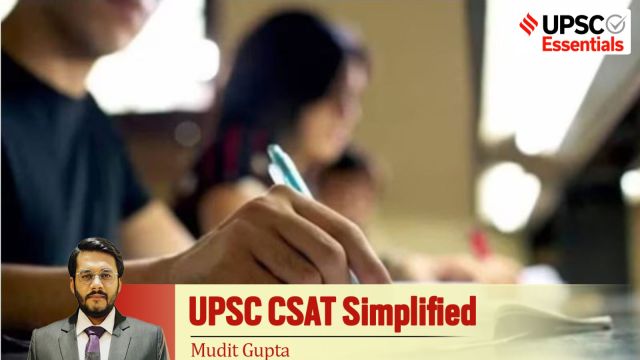Are you preparing for UPSC CSE 2025? You must not ignore the CSAT paper. UPSC Prelims 2024 had a clear message for students that CSAT practice has to be a constant part of preparation. So, UPSC Essentials’ special series ‘UPSC CSAT Simplified’ presents some important topics from the qualifying CSAT paper of UPSC prelims. The aim is to provide you with some tested methods to answer the questions correctly without wasting precious time.

About our Expert: Mudit Gupta has been a mentor and faculty for the UPSC Civil Services exam for 8 years with expertise in CSAT, Polity, International Relations, and Current Affairs. He is known to break complex concepts into simpler ones that allow UPSC aspirants to develop a grip over the subject matter.
How to deal with Comprehension in the CSAT paper?
Mudit: Comprehension is one of the most important pillars in the UPSC CSAT Paper at the preliminary stage. However, the comprehension section has changed considerably over the period, and aspirants sometimes find it hard to tackle such questions.
Let us consider a passage asked by the UPSC in CSAT 2023 and try to understand the correct modus operandi to go through the passage and tackle the associated question successfully. Also, for your better understanding, let us explore the correct mindset to read the passages neutrally and unbiasedly, keeping our day-to-day knowledge at bay.
Here’s the Comprehension Passage (CSAT 2023) :
Environmental problems cause health problems. Substantial changes in lifestyle can reduce environmental or health problems, but this idea appears almost impossible to adopt. With environmental problems, individual efforts can be perceived as having a negligible effect and therefore lead to inertia. With health, on the other hand, individual choices can make the difference between life and death, literally. And yet, barring a few, there seems to be the same collective lethargy towards making their choices.
Breaking up the paragraph:
For better clarity, let us break the paragraph and understand it line by line:
“Environmental problems cause health problems.”
Story continues below this ad
- This line sets the tone for the passage, establishing a clear link between environmental issues and their impact on human health. However, certain dimensions can come to your mind including air borne and water borne diseases. But since no such information is given in the passage, we should refrain from using our day-to-day common knowledge.
“Substantial changes in lifestyle can reduce environmental or health problems, but this idea appears almost impossible to adopt.”
- This line suggests that making significant changes to our lifestyle can have a positive impact on both the environment and our health, but there is a reluctance to adopt such changes. What lifestyle changes can be made is not clear from the passage. So, we should not make any assumptions about the nature of changes.
“With environmental problems, individual efforts can be perceived as having a negligible effect and therefore lead to inertia.”
- This line highlights the challenge faced by individuals to take action on environmental issues, as they may feel that their individual efforts won’t make a significant difference, leading to a lack of action (inertia). However, this line of the paragraph does not suggest that it is the sole responsibility of the government to tackle climate change. We should refrain from such interpretations.
“With health, on the other hand, individual choices can make the difference between life and death, literally.”
- This line emphasizes the significant impact that individual choices can have on our health. If we draw a conservative and careful conclusion, we can reach an understanding that individual efforts are required to tackle health and environmental problems. Health can be greatly impacted by individual efforts whereas, environment needs a broad-based collective approach.
“And yet, barring a few, there seems to be the same collective lethargy towards making their choices.”
Story continues below this ad
- Despite the importance of individual choices for health, many people (except for a few) still seem reluctant to make changes to their lifestyle, showing a similar lack of action (lethargy) as with environmental issues. They don’t wish to take action unless something major knocks on their door.
What’s the question?
Now, after having understood the paragraph line-by-line, let us look at the original question associated with the paragraph asked by the UPSC.
 Get an Express Edge with our UPSC Special articles by our experts.
Get an Express Edge with our UPSC Special articles by our experts.
Which one of the following statements best implies the most rational assumption that can be made from the passage?
(a) We are likely to spend more money on cure than prevention.
(b) It is the job of the government to solve our environmental and public health problems.
Story continues below this ad
(c) Health can be protected even if environmental problems go on unattended.
(d) Loss of traditional lifestyle and the influence of western values led to some unhealthy way of living.
Analysing the options:
Let’s analyse all the options one by one:
“We are likely to spend more money on cure than prevention”.
Story continues below this ad
- The passage highlights the reluctance of individuals to make changes to their lifestyle to address environmental and health problems, which may lead to spending more money on treating health issues rather than preventing them.
“It is the job of the government to solve our environmental and public health problems.”
- This option is not explicitly supported by the passage. While the passage mentions environmental and health problems, it emphasizes individual efforts and lifestyle changes, rather than relying on the government to solve these issues.
“Health can be protected even if environmental problems go on unattended.”
- This option is not entirely supported by the passage. The passage establishes a clear link between environmental problems and health issues, suggesting that neglecting environmental problems may have negative impacts on health.
“Loss of traditional lifestyle and the influence of western values led to some unhealthy way of living.”
- This option is not supported by the passage at all. The passage does not mention traditional lifestyle, western values, or unhealthy ways of living. It focuses on the relationship between environmental problems, health issues, and individual choices.
After analyzing the passage and the options, you will find that the answer is A.
Previous Article in the UPSC CSAT Simplified series:
How to approach Reading Comprehensions?
How to approach ‘Cubes and Dice’ questions?
How to approach ‘Calendar’ questions? (Part 1)
6 Tips to score 66.67 and qualify Prelims 2024 CSAT paper
How to approach ‘Calendar’ questions? (Part 2)
Story continues below this ad
Subscribe to our UPSC newsletter and stay updated with the news cues from the past week.
https://www.youtube.com/watch?v=wsnxUastCeM?si=-_5J99-z424sGqa8&w=560&h=315



 Get an Express Edge with our UPSC Special articles by our experts.
Get an Express Edge with our UPSC Special articles by our experts.






























